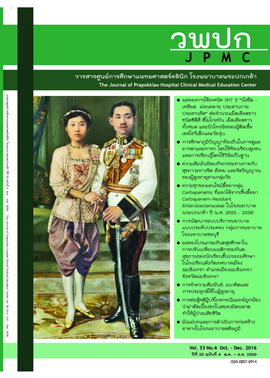การจำความสัมพันธ์: แนวคิดและการประยุกต์ใช้ในผู้สูงอายุ
Main Article Content
Abstract
Associative recognition memory refers to the ability of recognizing that two or more items have previously occurred together that is necessary for everyday episodic memory. Older adult commonly show difficulty binding unites of information together into a single memory trace. The associative deficit hypothesis (ADH) of aging is assumed to the result from a reduction of recollection due to a disproportionally large loss of hippocampal volumes. The recollection-based associative recognition includes remembering contextual information about the learning episode and is assumed to be strongly dependent on the hippocampus. In contrast of familiarity - based recognition which is an inability to identify any other contexts or things that had been recognized.
The main purpose of this article is to provide the concept of how to examine associative recognition memory with psychological and neurophysiology methods, mnemonic strategies that based on domain dichotomy view, deep processing, interaction with semantic memory, unitization hypothesis and interactive imagery. The second is to apply for developing brain training programs of elderly those promote and improve this associative recognition memory of both normal elderly and with memory deficit. In addition is to research on the effectiveness of the training program and various tests of associative recognition memory in order to get new knowledge in elderly care and future quality of life.
บทคัดย่อ
การจำความสัมพันธ์เป็นความสามารถของ บุคคลในการจำได้ว่า มีรายการข้อมูลความจำสอง รายการหรือมากกว่านั้นเคยปรากฏร่วมกันมาก่อน ซึ่งมีความสำคัญต่อการจำเหตุการณ์ต่างๆ ในชีวิตประจำวัน โดยปกติผู้สูงอายุมักมีความยากลำบาก ในการเชื่อมโยงข้อมูลความจำที่หลากหลายเข้าไว้ เป็นเหตุการณ์เดียวกัน ตามสมมติฐานความ สัมพันธ์บกพร่องในผู้สูงอายุ ซึ่งสันนิษฐานว่าเกิด จากปริมาตรของเนื้อสมองส่วนฮิบโปแคมปัส ซึ่ง ทำหน้าที่สนับสนุนการจำความสัมพันธ์ภายใต้ กลไกการจำจากการระลึกได้ลดลง ในขณะที่การ จำได้จากความคุ้นเคยยังคงทำหน้าที่ได้ตามปกติ
บทความฟื้นวิชานี้ได้เสนอแนวคิดเกี่ยวกับ วิธีการทดสอบการจำความสัมพันธ์ทั้งทาง จิตวิทยาและประสาทสรีรวิทยา การใช้กลยุทธ์ช่วย จำซึ่งมาจากทั้งแนวคิดมุมมองสองมิติ การเข้ารหัส ความจำระดับลึก การเชื่อมโยงกับความจำทาง ภาษา สมมติฐานการรวมเป็นหนึ่งเดียวและการ จินตภาพเชิงปฏิสัมพันธ์ รวมทั้งแนวทางการนำไปประยุกต์ใช้กับผู้สูงอายุโดยการสร้างชุดการฝึก จากกลยุทธ์ช่วยจำต่างๆ เพื่อส่งเสริมและฟื้นฟู การจำความสัมพันธ์ทั้งในผู้สูงอายุปกติและพร่อง ความจำรวมทั้งทำการวิจัยเพื่อศึกษาประสิทธิผล ของชุดการฝึกการจำความสัมพันธ์ดังกล่าวและใช้ วิธีการทดสอบต่างๆ เพื่อสร้างองค์ความรู้ใหม่ใน การดูแลผู้สูงอายุให้มีคุณภาพชีวิตที่ดีต่อไป

